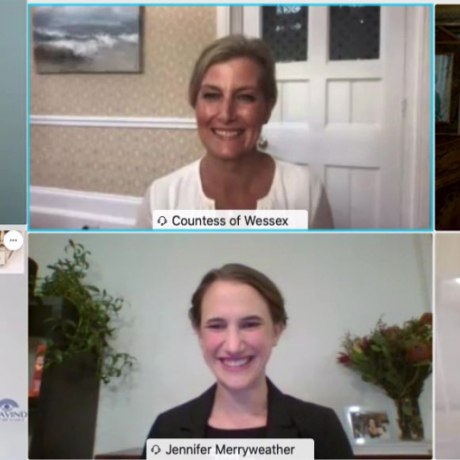World Sight Day 2020
Published

To mark World Sight Day 2020 Her Majesty The Queen joined Her Royal Highness The Countess of Wessex for a video call this week with eye health professionals working on the ground to deliver eye care across the Commonwealth.
The theme of this year’s World Sight Day, ‘Hope in Sight’, reflects optimism about the future despite the extraordinary challenges of the past months; and the hope and opportunity that good eye health and eye care can bring people with sight loss.
The Countess of Wessex, Global Ambassador for the International Agency for the Prevention of Blindness (IAPB), introduced The Queen to three inspirational leaders in their respective eye health fields, who joined the call from Sierra Leone, Australia and India. The three professionals shared experiences with Her Majesty and Her Royal Highness of the positive impact their work has had on the lives of those they have supported, helping to restore sight and save vision.
The participants
Dr. Jalikatu Mustapha (Ophthalmologist, University of Sierra Leone)
Dr. Jalikatu Mustapha has worked with local and international partners to make major changes to eye care delivery in Sierra Leone and bring about positive change. This has included completing a nationwide assessment of the eye health services available across Sierra Leone as well the very first cataract audit research. She has been instrumental in increasing rates of cataract surgeries in her department and in re-implementing a nationwide cataract surgical outreach campaign to hard-toreach populations. Dr. Mustapha has also worked to raise awareness of the burden of glaucoma in Sierra Leone. She has been involved in vital work to increase rates and quality of detection, treatment and surgeries as well as performing the first ever glaucoma research in the country. Her contribution has helped to strengthen health systems dedicated to the condition, from starting up clinics to bringing in patient lists. Her role in advocacy work for eye health has also meant that for the first time, surgical outreach was conducted in a hard to reach area (Kabala) exclusively using Government funds. In her role as a lecturer at the University of Sierra Leone she has also inspired others to take up ophthalmology as a career.
Ms Jennifer Merryweather (Senior Policy Advisor for the Indigenous Australia Program, The Fred Hollows Foundation, Australia)
Ms Merryweather has an extensive background working in policy and advocacy within the education and health sectors. She has been integral to the development of ‘Strong Eyes, Strong Communities: A five-year plan for Aboriginal and Torres Strait Islander eye health and vision, 2019-2024’. Her consistent efforts and advocacy have also been key to advancing Australia’s eye health role from that of a service provider to Aboriginal communities to capacity builder and champion for Aboriginal Community Controlled Health Services. As a result, priority has been given to investing in local capacity, including increased support for the funding for local service delivery positions and resources to enhance eye care for Aboriginal and Torres Strait Islander Peoples and their communities. Ms Merryweather’s contribution to shifting attitudes and behaviours in the eye health sector has also helped to address access issues for vulnerable populations. By actively encouraging the STRICTLY UNDER EMBARGO UNTIL 2200HRS BST ON FRIDAY 9TH OCTOBER, 2020 utilisation of Australia’s health financing system it has resulted in an increase of private ophthalmologists providing services fully covered by the Australian Government-funded health scheme to Aboriginal and Torres Strait Islander patients.
Mr. Natrajan Vengadesan (Quality Manager, Aravind Eye Hospital, India)
Mr. Vengadesan has worked for Aravind Eye Hospital in Pondicherry, India for 10 years as Patient Care and Quality Assurance Manager. He is a certified professional for Health Quality USA and certified professional for Quality Implementation. Mr. Vengadesan focuses on enhancing patient care strategies, managing patient complaints, improving quality care and leading patient safety initiatives. He is also a member of the IAPB’s Environmental Sustainability Working Group working on developing environmentally sustainable eye care delivery at Aravind. His major area of focus is ensuring patient safety in eye care delivery process. His achievements include developing the online incident reporting system, an anonymous error reporting system, creating staff awareness, and bringing in system and protocol changes to ensure patient safety. He is also involved in helping other institutions to develop patient safety strategies.
The participants spoke to The Queen and The Countess about the powerful impact that good quality eye care can have on people’s lives - enabling children to benefit from education; working adults to keep their jobs; and older people to participate in their families and communities. They also discussed the challenges the sector has faced during recent months as a result of the global pandemic. They shared their hopes for the future and the opportunities and innovations that will continue to improve eye care and strengthen eye health in the next decade.
During the call, Peter Holland, IAPB Chief Executive thanked The Queen and The Countess for their commitment to eye health over the years, noting the achievements and the legacy of programmes including The Queen Elizabeth Diamond Jubilee Trust in the Commonwealth and the culmination of the VISION 2020 period.


